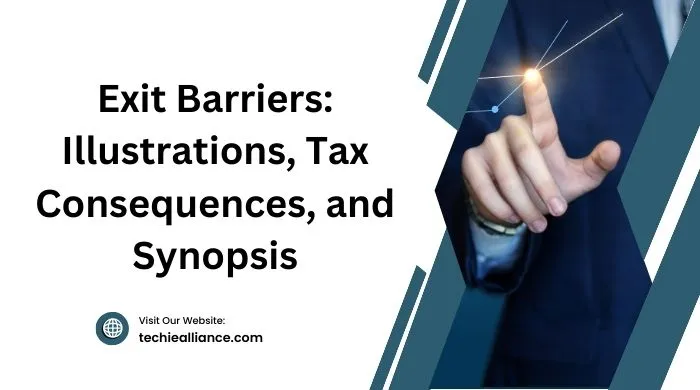Barriers to departure are the things that keep a business from leaving a market where it wants to split off or is thinking about stopping operations. High departure expenses, such as asset write-offs and closing costs, and highly specialized assets that may be challenging to sell or shift are common exit hurdles. Losing the goodwill of customers can also be a regular exit obstacle.
What Are Exit Barriers
Barriers to departure are the things that keep a business from leaving a market where it wants to split off or is thinking about stopping operations.
High departure expenses, such as asset write-offs and closing costs, and highly specialized assets that may be challenging to sell or shift are common exit hurdles. Losing the goodwill of customers can also be a regular exit obstacle.
Read also: Side Pocket: Definition, How Side Pocketing Works, Pros
Recognizing Exit Barriers
When a business can't make a profit or gain market share, it may opt to leave a market. It is possible for the dynamics of a certain market or sector to shift to the point that a corporation considers spinning off or selling off the impacted divisions and activities. However, a number of factors, both internal and external, as well as laws and other barriers, can make it impossible to sell the division or linked businesses.
For instance, a shop could choose to close underperforming locations in specific areas—especially if the competition has grown so strong that it seems doubtful that they would expand further.1. Additionally, a business may decide to move from one site to another if the latter gives access to a consumer base with greater incomes or maybe more foot traffic. It is possible, nevertheless, that the retailer is bound by a lease whose conditions make it impossible for them to close or relocate.
Regulations and Tax Breaks
A business may have been encouraged to open up shop in a particular area by subsidies and tax advantages provided by the local government. If the business tried to relocate its activities before carrying out the conditions and requirements specified in the agreement, such incentives may have come with heavy penalties.
Government rules may also make it challenging for a business to leave a market. Banks are frequently seen as essential for lending and fostering regional economic development. The government may prevent the sale of a bank to a third party if there are insufficient banks or too much competition in a certain area.
Expensive Equipment
High exit barriers might compel a business to stay in the market, hence escalating competition. Since specialized manufacturing necessitates a significant upfront investment in equipment that can only be used for specified activities, it is an example of a sector with high hurdles to departure.
Because of the significant amount of capital or money already invested in the cost of the equipment, a specialist manufacturer may have financial difficulties if they choose to transition to a new line of business. The business might not have the funds to grow into a new business venture unless those expenses are paid.
Read also: Best 1-Year CD Rates for May 2024
Effects on the Natural World
If an industrial company decides to close a plant or manufacturing facility that produced or utilized products that created environmental concerns, they may have to pay high cleaning fees. The cost of transferring the operation can be greater than the benefit of eliminating the substance.
Particular Points to Remember
High exit barriers might be detrimental to current businesses but could also present chances for new businesses wishing to enter the market. A firm that wants to go out of business might sell its assets to a new one for a good price. Due to debt or unprofitability, the firm selling the assets might not be in a strong position to negotiate for a premium price.3.
In other circumstances, businesses may purchase a competitor's troubled assets in order to keep a new business from joining the market. A rival may take advantage of strong exit barriers in order to negotiate a lower price for the assets if a firm is attempting to leave an industry with high obstacles to entry. By buying the assets, the corporation would be able to eliminate a competitor and stop a new company from entering the market, even though the cost could be high.
A Sample of Exit Barriers
Assume that Delta Airlines wishes to close its doors but still owes investors a substantial debt—money that was utilized to buy aircraft. Aircraft are unique assets that are uniquely utilized by the airline sector. In addition, the assets may have a low scrap value based on how old the planes are.
Read also: How to Use Mutual Fund Technical Indicators

